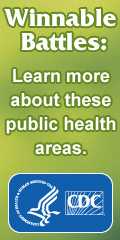January 2014
Did You Know? is a weekly feature from the Office for State, Tribal, Local and Territorial Support to inform your prevention activities. We invite you to read, share, and take action!
View the Current Did You Know?
January 31, 2014
- Big changes are coming on October 1, 2014, when the US will replace ICD-9-CM with ICD-10 code sets—a system used for classifying health conditions and in-hospital procedures.
- This change has implications for the way public health officials monitor trends [PDF – 168 KB] in diseases, injuries, healthcare visits, and hospital inpatient procedures.
- Public health entities should find out if their organization is affected and access helpful resources to plan for the transition by visiting CDC’s ICD-10 Transition website.
January 24, 2014
- Higher excise taxes increase the price of cigarettes, which can help discourage youth and young adults from starting to smoke. The average state excise tax on cigarettes is $1.48 per pack.
- As of June 30, 2013, 26 states and the District of Columbia had comprehensive smoke-free laws that protect nonsmokers from secondhand smoke in restaurants, worksites, and bars.
- For more information about the status of policies and practices relating to tobacco and 9 other public health topics in all 50 states and the District of Columbia, check out CDC’s 2013 Prevention Status Reports.
January 17, 2014
- Every 4½ minutes, a baby is born with a birth defect in the United States.
- US hospital costs for people with birth defects exceed $2.6 billion annually. Families, communities, and the government share these costs.
- Educational materials on birth defects can help raise awareness in your community during National Birth Defects Prevention Month and throughout the year.
January 10, 2014
- Only 1 in 6 adults and 1 in 4 binge drinkers report that a health professional has ever talked with them about alcohol use.
- At least 38 million US adults drink too much alcohol, resulting in about 88,000 deaths each year and costing the economy about $224 billion.
- Health professionals can use alcohol screening and brief counseling to improve the health of patients who drink too much.
January 3, 2014
- Mercury spills in schools are not only dangerous but also expensive to clean up.
- Mercury exposure [PDF-1.1MB] can affect the nervous system, lungs, and kidneys of children. Serious cases can result in brain damage—and even death.
- Help schools prepare for and prevent a mercury spill; visit the new Don’t Mess with Mercury website for educational materials and animated video messages.
Did You Know? information and web links are current as of their publication date. They may become outdated over time.
- Page last reviewed: November 9, 2015
- Page last updated: October 14, 2016
- Content source:



 ShareCompartir
ShareCompartir



